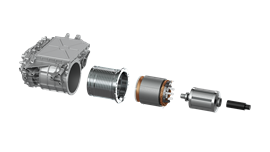Valeo, Mahle partner on electric motors for upper segment EVs
18 October 2024
French powertrain and thermal management system supplier Valeo announced it will work together with Mahle GmbH, a German automotive supplier and development partner, to extend Valeo’s portfolio of magnet-free electric motors towards upper segment vehicles. The agreement follows Valeo’s successful joint development with a European OEM on the EESM (Externally Excited Synchronous Motor) magnet-free electric motor technology.
 Valeo and Mahle are developing a magnet-free electric axle system for upper segment electric vehicles with peak power ranging from 220 to 350 kW. (Photo: Mahle)
Valeo and Mahle are developing a magnet-free electric axle system for upper segment electric vehicles with peak power ranging from 220 to 350 kW. (Photo: Mahle)
“Mahle develops the EESM rotor and their brushless excitation system. Based on our power electronics know-how, Valeo provides a dedicated control of this electric motor and brushless system embedded in our inverter. This partnership allows Valeo to complete its EESM portfolio towards upper segment and is key to support the evolution of the automotive industry towards more innovative sustainable solutions,” said Xavier Dupont, Valeo Power Division CEO.
The Joint Development Agreement will combine Valeo’s experience in electric motors, inverters and associated motor control laws with Mahle’s knowledge of magnet-free rotors and the Mahle Contactless Transmitter (MCT) technology to develop a magnet-free electric axle system targeted to electric vehicles with peak power ranging from 220 to 350 kW (295 to 470 hp). The iBEE system (inner Brushless Electrical Excitation) technology aims to “revolutionize performance and efficiency of magnet free electric motors,” the announcement stated.
“In this project two front runners of electrification are joining forces,” said Martin Wellhoeffer, member of the Mahle Group Management Board. “The new e-axle will benefit from Mahle’s expertise in contactless transmitter technology. Together, we will be setting a new benchmark in packaging and efficiency for EESM based e-axles and taking the next step for our customers towards future mobility.”
The companies are developing a cooling concept capable of achieving the optimal continuous to peak power ratio. In addition, the carbon footprint is expected to be reduced by more than 40% compared to a permanent magnet electric motor of equivalent power.
The testing of the first prototypes will be completed by the end of 2024.
STAY CONNECTED


Receive the information you need when you need it through our world-leading magazines, newsletters and daily briefings.
CONNECT WITH THE TEAM











